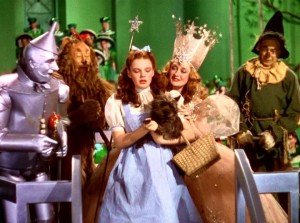Dorothy: Oh, will you help me? Can you help me?
Glinda: You don’t need to be helped any longer. You’ve always had the power to go back to Kansas.
Dorothy: I have?
Scarecrow: Then why didn’t you tell her before?
Glinda: Because she wouldn’t have believed me. She had to learn it for herself.
In order to survive and thrive, babies have complete reliance on their parents. As they grow and learn, we need to help them build self-reliance.
What is self-reliance?
A person who is self-reliant is self-sufficient, able to think and function independently, is not risk-averse and solves problems rather than worries about them. Such a person would trust his own judgment, rarely needing to consult others for advice or guidance. A self-reliant person has better control of his life and can handle any curveball that life may throw his way. This is exactly what we want to build in our adult children.
Here are strategies that can be used as a starting point, and consider age appropriateness.
- Give kids responsibility – and hold them accountable for completing tasks.
- Don’t do things for your children they can do for themselves. Three-year-olds can make their beds. An easy way to do that is to take three pictures as an example and hang the pictures by the bed.
- Let them problem solve – be your child’s coach rather than sage.
- For a middle school aged child with a problem with friends…Ask them, “What’s bothering you?” Let them explain and then assure them… “I know you can figure this out.” Give them time and ask, “How do you think you can fix this problem?”
- Make room for mistakes – nothing is perfect, especially not at first.
- They are learning self-reliance so they aren’t going to get it right all the time, whether it is how to make the bed, take the garbage out, set the table for dinner, or put windshield washer fluid in the car. Don’t jump in to ‘rescue’ them or hover over them. We learn by our mistakes.
- Other ideas:
- Begin with small tasks. Don’t say, “Clean up this room.” But instead, “Put the Legos in the bin.”
- Encourage ‘free-play” throughout the day. Children need time to make their own rules, pretend and establish boundaries.
- Schedule daily chores – children should learn early they are part of a family and that means helping with chores. Create a chore chart, with pictures for younger children.
- Provide options when possible. Choice should be limited for younger children, and can increase as children mature. This helps them become independent thinking. This often begins with choices in what they are going to wear.
- Give them stretch goals – ask them to do a little more than might be expected. That can be great for their self-esteem. You may even want to plan what new things they can try for the week. As an example, think of household skills, cooking skills, financial skills, or life skills.
- Recognize them for things they’ve done well, but don’t recognize them for things they haven’t; the praise will be meaningless. Say, “Great job on putting all the Legos away!” or “Thank you for bringing the dinner dishes over.”
Since I opened with a classic movie line that helps reinforce the concept of self-reliance, I would like to close with one as well.
From Indiana Jones and The Last Crusade
Professor Henry Jones to Indiana Jones:
Did I ever tell you to eat up, go to bed, wash your ears, do your homework? No, I respected your privacy and I taught you self reliance.
Follow us all week for additional tips follow us on Facebook, Twitter and Instagram. As always, please share your thoughts because we are all in this together!
See you next week.
Tina Nocera, Founder
#parentalwisdom #self-reliance #valueoftheweek
Follow on Facebook
Follow on Twitter
Follow on Instragram
Parents Ask, Experts Answer:Nurturing Happy, Healthy Children


